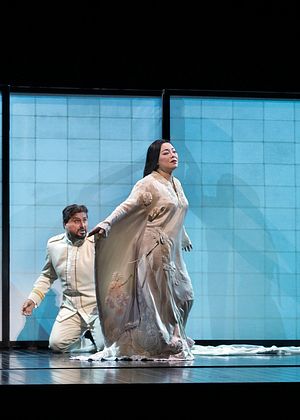The week, Chinese soprano He Hui starts a new run of “Madama Butterfly” at New York’s Metropolitan Opera. In these performances, as in the more 150 times that she has sung Cio-Cio-san, it cannot be lost on the audience what stands in front of them: a soprano from China singing in a temple to Western opera, the ultimate of East-meets-West stories performing Giacomo Puccini’s East-meets-West masterpiece.
Arguably the most successful Western opera singer to come out of China, soprano He Hui’s story begins in her hometown of Xi’an, China, where she began studying music for the first time as an 18-year old at the prestigious Conservatory of Music. She finished second in Plácido Domingo’s Operalia competition and made her debut as Tosca in the notoriously difficult opera city of Parma. She was the first Chinese soprano to sing Tosca at La Scala and the first to sing Aida at both the Vienna Staatsoper and New York’s Metropolitan. As she approaches 20 years as a professional singer, He Hui’s story has been one of East meeting West and of East and West living alongside each other.
Three roles play major parts in her career: Cio-Cio-san, the 19th-century diva Tosca, and the Ethiopian princess Aida. He Hui identifies with Cio-Cio-san, the young Japanese woman caught between East and West. When playing the enslaved Ethiopian princess Aida, she draws on the character’s strength, but also understands Aida’s dilemma of love, family, and patriotism. But perhaps it is the role of Tosca that holds the key to He Hui’s story. As Tosca sings in the piazza outside Palazzo Farnese, her voice is heard by both the characters on stage as well as the audience watching the opera. Baron Scarpia, the chief of the secret police, identifies Tosca by her voice; to the audience, as well as to Scarpia, the woman they hear is the Italian diva Tosca, rather than the Chinese soprano He Hui.
If He Hui is Butterfly because she understands what it means to be a young Asian woman with hopes and aspirations for a life outside of her traditions, she is also Tosca; she is as much a celebrated singer as she is an Asian woman — her italianità is as believable in Puccini’s Tosca as is the Asianness she exudes in Butterfly. He Hui’s connection with Butterfly is there for all to see, but her connection to Tosca — she becomes Tosca — is perhaps less immediately self-evident. Perhaps this makes it all the more extraordinary: her Italian comes from living, breathing, and singing in her adopted home and the country of opera’s origins.
This is, from the perspective of both China and Italy, more than a human story of cross-cultural artistic dedication and success, for it was Italy — and really could have only been Italy — that was her first step on this journey.
“Soft power” is, for a term so widely used, difficult to exactly define but easy to recognize. It refers to the ability of a country to project international influence other than through military might or direct economic prowess. The United States — the country whose soft power has been deployed most extensively and to greatest effect — is often taken as the model for other countries. But the United States has advantages that other, smaller countries do not in general possess. Italy, for example, does not produce its cultural products in English, the world’s global language, nor are there domestic markets for popular-culture goods and services anywhere near as large and deep.
For soft power to be effective, it must be in an area in which the country excels. For Italy, one of these is opera. There is of course French, German, Russian, and even English opera as well, but opera is particularly Italian. This is a matter of history — Italy pretty much invented Western opera and much of Western classical music as well, which results in most of the terms used, from soprano to legato, coloratura, allegro and piano, being Italian. Audiences around the world even cheer in Italian (“bravo”).
But it isn’t just precedence: it has been estimated that about 80 percent of the operatic repertoire is Italian. Even outside Italy, perhaps one of every two operas being performed at any given time is in Italian. Many composers from Handel and Mozart to the Brazilian Antônio Carlos Gomes wrote operas in Italian. Donizetti, Rossini, and Verdi all wrote operas in French, but almost all were quickly translated back into Italian and remain part of the Italian repertoire.
Opera, therefore, has proven to be one of Italy’s key avenues of soft power. It has spread around the world, and leading singers come from everywhere; great performances are sung from New York to Beijing. But opera’s soul is still in Italy. And that is why singers like He Hui and an increasing number of her countrymen, as well as students from Japan, South Korea, and throughout Asia, make this journey west.
There may be many reasons to learn Italian, but opera is one of the primary professional ones: one cannot survive without it. He Hui herself soaked it up through more than 15 years of living in Verona; she attributes much of her success, artistic and otherwise, to precisely this linguistic and cultural immersion. Yet she remains Chinese, and a bridge between peoples.
Opera is growing in China, with many new opera houses coming online and an increasing number of new singers being trained domestically and abroad. Opera productions need not just performers and musicians, but stage directors, set designers, costumes, and, these days, video technicians, all of which Italy is also expert at.
As far as Asia is concerned, therefore, Italy’s past may well prove its future.
Melanie Ho is the author of Journey to the West — He Hui: a Chinese Soprano in the World of Italian Opera. Antonello de Riu is the Consul-General of Italy in Hong Kong and Macau.

































